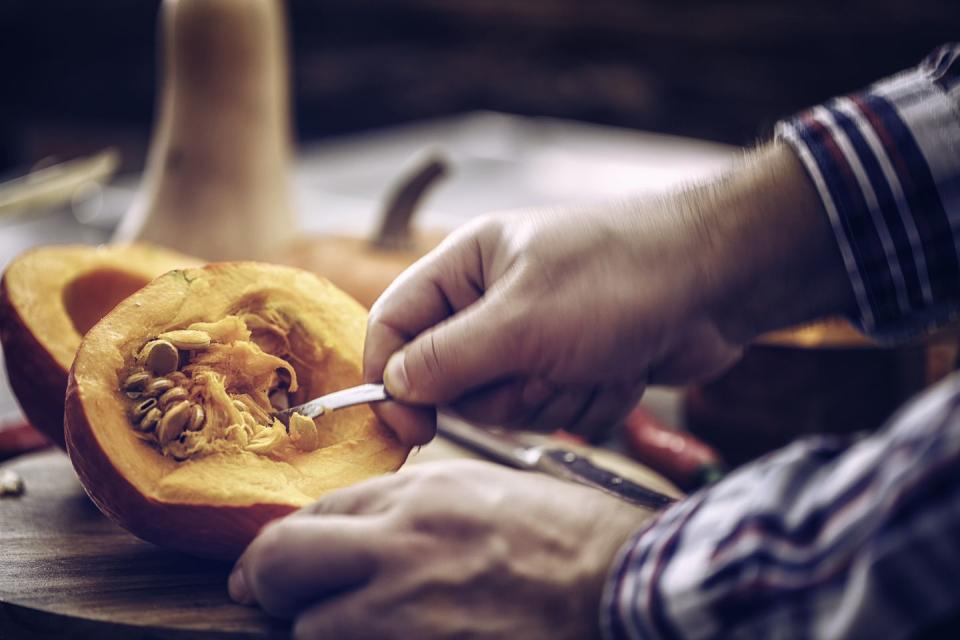Decolonizing Your Diet Has a Whole Host of Amazing Benefits
"Hearst Magazines and Yahoo may earn commission or revenue on some items through the links below."
DECOLONIZING YOUR DIET has become somewhat of a social movement.
On Instagram, there are more 15,000 posts carrying the hashtag #decolonizeyourdiet.
But removing colonial influence from your diet is not just about putting down pizza and pasta. It’s important to acknowledge the history of Indigenous people in North America, including colonization.
“Colonization has taken so much from many of the cultures, and part of that being knowledge around food systems,” says Michael Wesley, of Indigenous Health and Nutrition Consulting.
“Western society has devalued Indigenous knowledge and viewed it as primitive since colonization started," Wesley says. "Evidence shows traditional food systems have addressed health disparities before they became the issues we see today. Traditional food systems and nutrition are the opposite of being primitive. They are sustainable, and promote healthy living.”
Food on reservations has been heavily influenced by the federal government. Indigenous people were forced to depend on the government for a lot of things, including heavily processed foods. Now, many Indigenous communities rely on canned foods because they last a long time. Popular foods on reservations have a long shelf life, likely because 49 percent of Indigenous tribes do have running water or basic sanitation.
If you're curious about decolonizing your own diet—or even just what that entails—here's what the experts say.
What is a decolonized diet?
For many Indigenous people, decolonizing their diets means removing western European influence entirely.

Indigenous food often includes fruits, vegetables, and herbs from one region. From supporting local farms to shopping for traditional ingredients, there are plenty of ways to decolonize your diet.
Decolonizing your diet involves learning how to connect with the land, find native ingredients, and prepare ancestral dishes. It involves a deep appreciation for the land you live on, and the food that comes from it.
Decolonizing your diet is not a trend or fad, it’s a way of life, which requires looking into your ancestral history. It means supporting small minority-owned businesses rather than fast food or restaurant chains. Removing typical western European ingredients from your diet may be empowering for some.
How do you decolonize your diet?
To start, “If you're an Indigenous person to this continent, it means you will consider adding a lot more of your local regional foods,” says food activist and chef Neftalí Durán.

Indigenous Labs and The Sioux Chef founder Sean Sherman also has some solid advice on decolonizing your diet. Sherman is a James Beard Award winning chef with a mission to educate the public about Native American foodways and traditions.
Sherman recommends decolonizing your diet by eliminating ingredients that were introduced by western Europeans. That means wheat flour, dairy products, cane sugar, beef, pork and chicken in order to focus on Indigenous food systems. Many people who remove western European foods from their diet will not consume meat. If you’re planning to decolonize your diet, stock up on some Indigenous staples like corn, beans, and pumpkin seeds.
Make sure to become familiar with the plants and animals in your area. “It's just understanding Indigenous histories and cultures where you might be living. Then, it's understanding how we build modern Indigenous foods, and how we create a philosophy doing that,” says Sherman. “It was invisibility of Indigenous perspective. There were hardly Native restaurants. There were barely any books on the subject. We're attempting to create a support system to bring this into the mainstream. People are starting to normalize Indigenous foods on a larger scale.”
What are the benefits of a decolonized diet?
“Most Native foods were chosen because they contributed to health," says Catriona Rueda Esquibel, who co-authored Decolonize Your Diet: Plant-Based Mexican-American Recipes for Health and Healing. "A lot of them had protective benefits against things like high blood sugar. Eating beans, eating cactus, those kinds of things, keep your blood sugar from peaking. It’s something we need right now, and it's not met with standard American diet."
A 2021 study from the Assembly of First Nations, the University of Ottawa, and the Université de Montréal found that traditional food contributes to the overall health and well-being of Indigenous people.
And at the University of McGill’s Centre for Indigenous Peoples’ Nutrition and Environment, a study in 43 arctic communities revealed there are many benefits to consuming traditional foods, including consuming less calories, eating more lean meat and fish, and feeling a deeper connection with their heritage.
You Might Also Like

